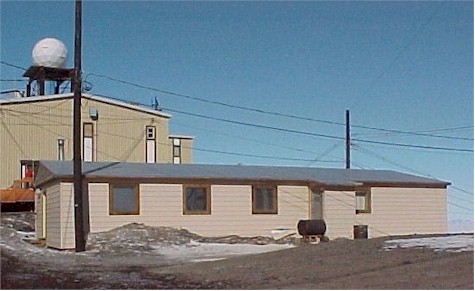TIGER in Antarctica
Crime and Punishment
One of the student questions was what would happen to you if you did something wrong down here in Antarctica. To get the straight answer, I went and talked to Bill Coughran, who is the National Science Foundation Station Manager. He is also a Special Deputy with the U.S. Marshalls, and is basically the only law enforcement down here. That isn't to say that more law enforcement is needed. This is a small, tightly-knit community of mostly dedicated people, and there just isn't much problem.
To become a Special Deputy, Bill received 10 weeks of training in crime investigation and evidence collection and handling. But his major job, in the case of a serious crime, would be to protect the scene and evidence until professionals (possibly FBI agents from Hawaii) arrive. He also goes for periodic refresher courses to stay on top of things.
McMurdo is under the jurisdiction of the U.S. Attorney in the District of Hawaii. Not only is Hawaii the closest Federal Court, but they have a lot of experience in handling crime in remote sites, because they are responsible for the Pacific Ocean including American Samoa, Guam, etc. However, they are busy and really only interested in serious crimes. Minor infractions, such as petty theft, are handled locally with penalties such as expulsion from Antarctica and losing one's job.
 The only serious crime that has happened is an "Assault with a deadly weapon". Two individuals had a history of dislike, and finally one of them swung a hammer at the other one's head. No permanent injury occurred, but it did draw blood. Since there is no "brig", the attacker was detained in Hut 10. As you can see, it is pretty comfortable confinement.
The only serious crime that has happened is an "Assault with a deadly weapon". Two individuals had a history of dislike, and finally one of them swung a hammer at the other one's head. No permanent injury occurred, but it did draw blood. Since there is no "brig", the attacker was detained in Hut 10. As you can see, it is pretty comfortable confinement.
Photo on right: Hut 10 at McMurdo Station
They were certainly not worried about him escaping, and were more worried that he would commit suicide than be a danger to others. He was shipped back to the states, successfully prosecuted, and received 4 years for the assault.
But prevention is certainly the name of the game, especially during the long winter. Problems can mostly be prevented by careful screening of personnel and by early intervention, if a problem seems to be developing. Nearly all the serious crimes likely to be committed here are crimes of passion, and there is usually some warning that a person is at risk of "snapping". I certainly have had no fear of becoming the victim of ANY criminal activity while down here.

Dr. Eric R. Christian
Eric's Featured Scientist Profile
This page was last modified on December 19,
2002
|